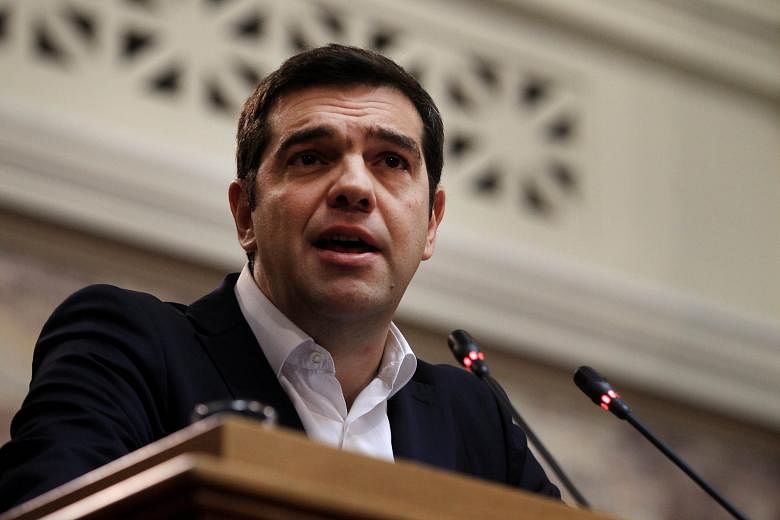ATHENS • Greece was set to unveil a painful 2016 draft Budget yesterday meant to satisfy international creditors, projecting the economy will stay in recession next year before returning to growth in 2017, in line with the estimates by the country's lenders.
After seven months of heated negotiations with its European Union/International Monetary Fund creditors, Athens agreed in July to implement spending cuts and economic reforms in exchange for a €86 billion (S$138 billion) bailout that kept it in the euro zone under strict supervision.
Although government officials have expressed optimism that the recession this year will be milder than projected in the bailout programme, due to an increase in tourism revenues and stronger than expected first-half data, any change in the economic forecasts will only come later.
The debt-ridden economy is officially expected to shrink by 2.3 per cent this year and 1.3 per cent next year. Public debt is seen rising to 196 per cent of gross domestic product in 2015 and peak at 201 per cent in 2016, including the new loans.
"The main targets of the draft Budget will not differ from the estimates in the bailout," a Finance Ministry official told Reuters. "Our estimate is for a shallower recession this year and that might be reflected in the final Budget that will be submitted to Parliament in November, after the first review of the new programme," the official said.
The bailout projects a 0.25 per cent primary budget deficit before debt service this year and a surplus of 0.5 per cent next year.
Greece is meant to achieve a primary surplus of 3.5 per cent of GDP a year from 2018 under the August deal. Athens wants to conclude the first bailout review and recapitalise its banks as soon as possible to launch talks with euro zone governments on debt relief, hoping to lure back investors and eventually regain market access, leftist Prime Minister Alexis Tsipras told lawmakers on Saturday.
Diplomats and Greek officials say Mr Tsipras and his Syriza party have decided to stop fighting the creditors for now and comply with the bailout in the quest for early debt relief and a return to economic independence.
Finance Minister Euclid Tsakalotos was set to meet his euro zone counterparts in Luxembourg yesterday evening to discuss a set of reforms that Athens needs to enact by mid-November to qualify for the next tranche of bailout funds. At the same time, Mr Tsipras will present his four-year government programme to lawmakers in Athens before a confidence vote tomorrow.
The government controls 155 MPs in the 300-seat Parliament and is expected to pass the vote easily. Mr Tsipras was re-elected last month on a mandate to implement the bailout and find ways to ease the social pain that it will entail for the poorest Greeks.
Government officials said he will tell Parliament that Greece will stick to the bailout, fight corruption and reform the state. But he will also outline what the government calls "grey areas" where it believes it can negotiate better terms or find alternative measures with the same fiscal impact.
Along with debt rescheduling, these areas include labour law, pension reforms, the liberalisation of the energy market and a controversial 23 per cent tax on private education. "We want to dive deep, complete the bailout review and the bank recapitalisation, and then move on to the debt talks," a government official told Reuters.
REUTERS

